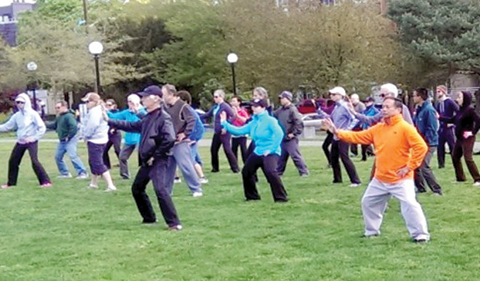 LONDON: For people with chronic illnesses ranging from cancer to arthritis, Tai chi exercises may improve walking, build strength and reduce pain, according to a new analysis of past research. The slow and gentle movements of Tai chi, a modified form of an ancient Chinese martial art, may be especially suitable for middle aged and older people with multiple health conditions, the authors write in the British Journal of Sports Medicine.
LONDON: For people with chronic illnesses ranging from cancer to arthritis, Tai chi exercises may improve walking, build strength and reduce pain, according to a new analysis of past research. The slow and gentle movements of Tai chi, a modified form of an ancient Chinese martial art, may be especially suitable for middle aged and older people with multiple health conditions, the authors write in the British Journal of Sports Medicine.
"Given the fact that many middle-aged and older persons have more than one chronic condition, it is important to examine the benefits of treatment/exercise interventions across several co-existing conditions," lead author Yi-Wen Chen, from the University of British Columbia in Vancouver, Canada, told Reuters Health by email. Chen's team analyzed results from 33 studies that looked at the effects of Tai chi among people with four chronic conditions: cancer, heart failure, osteoarthritis and chronic obstructive pulmonary disease (COPD), a group of lung disorders that make breathing difficult. Some of them also had additional health problems.
Breathing control
Tai chi is a set of exercises that emphasize breathing control, whole body exercises with bent knees and slow, flowing movements. In addition to strength, it can help to improve posture, balance and concentration, the researchers note. The studies Chen and her colleagues collected had a total of more than 1,500 participants and used Tai chi as an intervention for any of the four chronic conditions.
The researchers assessed the effect of Tai chi on how far a person could walk in six minutes, lower body muscle strength, the time required to go from sitting to standing, quality of life and depression. The researchers also looked at the effects on specific symptoms of certain conditions, such as pain and stiffness in osteoarthritis and breathing problems for people with COPD.
They found that performance on the six-minute walking test improved for both heart failure and COPD patients. Tai chi also improved knee strength in one heart failure study and one COPD study. Tai chi helped to decrease depression in heart failure patients, while other interventions such as stress management worked better than Tai chi for cancer patients. Tai chi did not improve blood pressure in heart failure patients. For osteoarthritis patients, the time taken to stand up, overall physical function, and general quality of life significantly improved with Tai chi. Symptoms of pain and stiffness were also markedly reduced.
Normal walking
Rhayun Song of Chungnam National University in Korea, who studies Tai chi's effect on osteoarthritis but wasn't involved in this new study, said Tai chi is well suited to people with chronic conditions who may have physical limitations. "Tai chi can be modified according to their physical condition (i.e., in sitting, standing, less bended knees, small steps, etc.) to perform it within their comfort zone," Song said by email.
Song also noted that an advantage of Tai chi over other exercise is the particular style of Tai chi walking, which is different from normal walking. In this exercise, a person first takes an "empty" step, then transfers the weight. This movement explains "why we can expect to see the improvement in knee muscle strength, balance, bone mineral density compared with other types of exercise," Song said. Chen advised that anyone starting a new exercise program should consult with their doctor to ensure it is safe. "This type of exercise can be enjoyable, improve fitness and well-being without aggravating symptoms," she said.-Reuters










